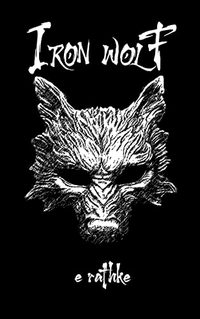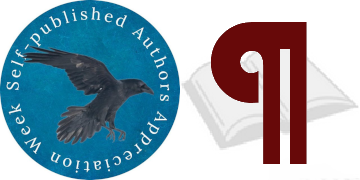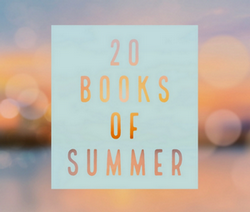
e rathke is one of those authors that came my way thanks to JCM Berne–I’d never encountered them or their work before, but there’s plenty of good looking material out there to dive into.
In particular, I’d like to point you to Iron Wolf, which is released today. The description of it is:
The giantess Lady Agova leads Virgil and Vera home to Avalon. All they have to do is get through the gate. But that gate throws them into an interdimensional labyrinth full of nightmares. 
Set in a desolate postapocalyptic world where science and magic blend and reality itself twists and bends, where some attempt to grow a new world while others delve through the detritus of a shattered civilization, Iron Wolf continues the monster hunting journey began in Howl.
Before we get into things, why don’t you give the reader a brief introduction to you and your work.
I write weekly essays about games and books at my substack. All my essays are free and available to anyone. I’ve begun serializing a steampunked mix of Harry Potter and Gundam over there as well. On top of that, I’m now releasing weekly short stories. Paying subscribers get the ebook versions of my novels included in their subscription and they receive those a month before publication.
Along with all that, I also publish novels. The Howling Earth is a lofi cyberpunk mashing together of Vampire Hunter D and Gene Wolfe’s Book of the New Sun, though I’ve also received a fair amount of Dark Souls comparisons as well. The first novel came out December 2022 with the second novel out this week, and a third coming in November. 2024 will have four more.
With Kyle Muntz, I cowrite The Shattered Stars series. Imagine Star Trek: The Next Generation where the crew is straight out of Firefly and you get The Shattered Stars. Though it’s an ongoing serial, each “episode” is meant to stand alone and be enjoyed even for those who just want to dip in and out of the series. The first episode came out in March, with the second out in June. The third and fourth are coming September and December, and we have the entire second season completed and ready to publish quarterly through 2024.
But, yeah, lots going on! I’m also narrating a children’s serial about a pirate named Carrot. This began as a daily bedtime story for my son, but I began recording it as well so that he can return to the story whenever he wants. Because I had the audio already done, I began a podcast to release new episodes weekly.
(I love the idea behind the podcast, will be adding it to my rotation)
Do you do your own cover design, or have you found people to help with that? It seems almost as difficult as writing the novel itself–talk about the process a bit.
Most of my covers are done by Christopher Olson. I wish he had a website because he’s a great artist. Very talented and capable of just about any style I want.
I’ve toyed with the idea of doing covers myself, since I go through a lot of them each year, but that really just isn’t my skillset. Christopher is a friend and we work well together. I usually tell him what I want for the cover and try to lead him towards a style that I’m looking for. Then he does his magic and I’m always surprised by what he shows me.
Ultimately, the book cover is your face to potential audiences, so it’s worth it to take the time and find the people who will give you what you want and how you want it. Covers can be expensive, too, which is probably the biggest barrier for some. For that reason, they’ll decide to do their own covers. Which is great! But it’s really not what I’m good at.
It’s great to have a friend like that! The graphics on my site are the same way—if they look homemade, that’s me (frequently, it’s me defacing the work of a talented cartoonist/illustrator). If they look decent, that’s the work of a friend of mine who does graphic design.
Ha, I wish I even had the talent to make bad art. It would save me a lot of time! It would also allow me to do my own illustrations for my books, which I’d love to have.
What made you decide that self-publishing was the direction you wanted to go? How often do you question that choice? How do you get through the self-doubt?
During the 2010s, I was pretty involved in small independent publishing. I worked with a handful of publishers in various ways, and I had three novels come out on independent presses.
Many have a good experience this way, but I mostly did not. I think the truth of small independent publishing is that many people just want their name in print and are less concerned with getting readers. This is especially true for the kind of publishing I was involved with, where many of the authors were MFA professors, aspiring MFA professors, MFA students, or aspiring MFA students.
The publication was more important for their CV than it was for anything else.
I don’t have an academic background. I wasn’t in an MFA or getting into one, and so I had very different goals with my own publishing. My bad experiences with these publishers—all of which no longer exist—led me to abandon publishing for about eight years.
I turned to self-publishing because of the freedom it allowed me. And so I don’t question the choice. I much prefer it to what I previously experienced through a more traditional route. To me, self-publishing is just fun. It also gives me control over my career and the flexibility to do what I want, how I want.
I publish a lot of books each year. If I were on a traditional press, they’d want me to have at most one or two books per year. In 2023, I’m publishing eight books. In 2024, I’ll be releasing 12.
There are downsides to this rapid pace, but I’m writing for fun and for those people who are ready and willing to ride along with me. When someone discovers one of my books, I want them to google me and find a dozen other books waiting for them.
As a reader, I always found that experience thrilling.
Having a backlist to dive into as a reader is always great, I agree. And more than one self-published author I’ve talked to has mentioned getting things out regularly. Eight books in a year is pretty impressive! How do you find the time for this? Sure, you multitask by podcasting your bedtime stories—but even that’s an investment of time after your son’s asleep.
Recording audio takes me quite a lot of time! I’m sure many people can do this in a fraction of the time it takes me but I would say it takes me about an hour to get ten minutes of audio. And even that audio could probably be improved tenfold by just a bit more technical know-how.(I was kidding about that, I hope that came through. I’ve listened to two episodes so far and those hours spent are evident!)
As for finding the time – I write a lot and I write relatively quickly. I’ve written a bit about my process in the past, but there is no trick to it beyond volume of hours sitting in front of your computer.
The one advantage I have over other people is that I have 20 or more novels and novellas sitting unpublished on my computer, so I could publish ten books a year for two years without even writing something new. That being said, only one novel coming out this year is taken from that store of novel(la)s. Though cowriting four per year also helps alleviate some of the load.
Also, length is an important driver. For better or worse, I’m primarily publishing novellas in the 20,000 word to 35,000 word range. I want people to be able to pick these up and read them in about the time it takes to watch a movie (sometimes a long movie). This may prove to be a mistake because people may want those big beefy novels. I have those written, too, but I guess I’m saving them.
Most countries have a thriving novella market, except the US. But I think we could have that and I think people want short books along with the big doorstoppers. With everyone else writing the huge books, I feel there’s a real space left open for people who want to pick up a book they can burn through in an evening.
Have you thought about trying to get a deal with major (or indie) publishers for upcoming works, or are you planning on sticking with self-publishing?
I do submit novels to major publishers. I’d be more than happy to get on a traditional press, though I think my goals are different than other hopeful writers.
The barrier to any writers—traditional or indie or self-published—is discoverability. You can be the best writer in the world, but if no one hears your name, they’ll probably never find your books. And so much of marketing for any book is a simple process of getting your name out there enough times for people to finally take notice.
For me, the benefit of a major press is that they make the first step easier. If I had a book come out on Tor or Harper or wherever else, thousands of people who had never heard of me would now hear or see my name for the first time.
That’s what I want. I mean, I’d be happy to have a successful book on a major publisher, but even if my book technically failed, by traditional publishing terms (fewer than 5,000 books sold), that would still be a success for me and where I’m at right now.
And so the benefit to me about major publishing is that it would broaden my potential fanbase immensely overnight.
Even so, it’s important to understand what major publishers are offering. Major publishers once gave every author a marketing budget and they’d have professionals handle this stuff. Now, they rely on individual authors to do their own marketing, line up their own book tours and interviews, and so on.
Which is the exact same thing self-published authors are already doing.
Because of this, the benefits that they offer are becoming fewer and fewer every year.
What is your favorite and least favorite thing about being self published?
My favorite thing is the flexibility and control.
My least favorite part is everything else!
I love writing. I would write all day, every day if I could. It’s what I want to do and it’s what I like doing. My ideal situation would be finishing a novel and handing it off to someone else to handle all the marketing, publicity, and so on.
Unfortunately, there’s just me. And so I’m not only the author. I’m also the business manager, the marketing department, the publicist, the accountant, the editor, and on and on.
It’s quite a lot!
In an ideal world, I wouldn’t have to do anything to get my name out there. I wouldn’t be on social media or pitching myself to podcasts or trying to track down reviewers and interviewers, and all the other thousand little things that get books into reader’s hands.
But instead I’m in this world, wearing a dozen hats and swapping between them dozens of times per week.
But that’s the game. And it is a game. Writing is fun and it’s work, but it’s the fun kind of work that makes it feel like play. The marketing is the work I’d rather not do, but it’s arguably just as important—if not more so—than the writing itself.
You’ve mentioned the word “flexibility” a few times—is that flexibility in schedule, genre, format, etc.? Or is it more than that?
All of the above, honestly. I love a lot of different kinds of books and though it goes against any career or marketing advice anyone will give you, I intend to keep writing across genres. Too, most would probably encourage me not to publish 6+ books a year because it can dilute or overwhelm your audience. Much as I’d like people to pick up a new book from me every month, the simple truth is that most people only read a handful of books each year. Expecting them to read a new book by me each month is a big ask! But there are other people out there who will be excited by this as well.
And so flexibility may be a double-edged sword for me, in that it gives me the freedom to make too many mistakes at the same time. And much of what I’m doing now may be foolish. Short books published at a rapid pace may be the exact opposite of what I should be doing, but I’ll learn. If need be, I’ll publish fewer books, but longer books.
But it’s this flexibility and this wild west nature of my publishing adventure that keeps it fun and exciting. I just hope people are willing to come along for the ride.
Thanks for your time and participation! Hope you enjoyed it! And do know that there are many of us out here who appreciate and applaud what you do (and our number is growing)!
Readers, e rathke has a good number of novellas, essays, and other things out there. Be sure to check out them out here or the other links above!

Clker-Free-Vector-Images from Pixabay
The 2023 Self-Published Authors Appreciation Week Logo was made by Witty and Sarcastic Book Club
 Howl
Howl






